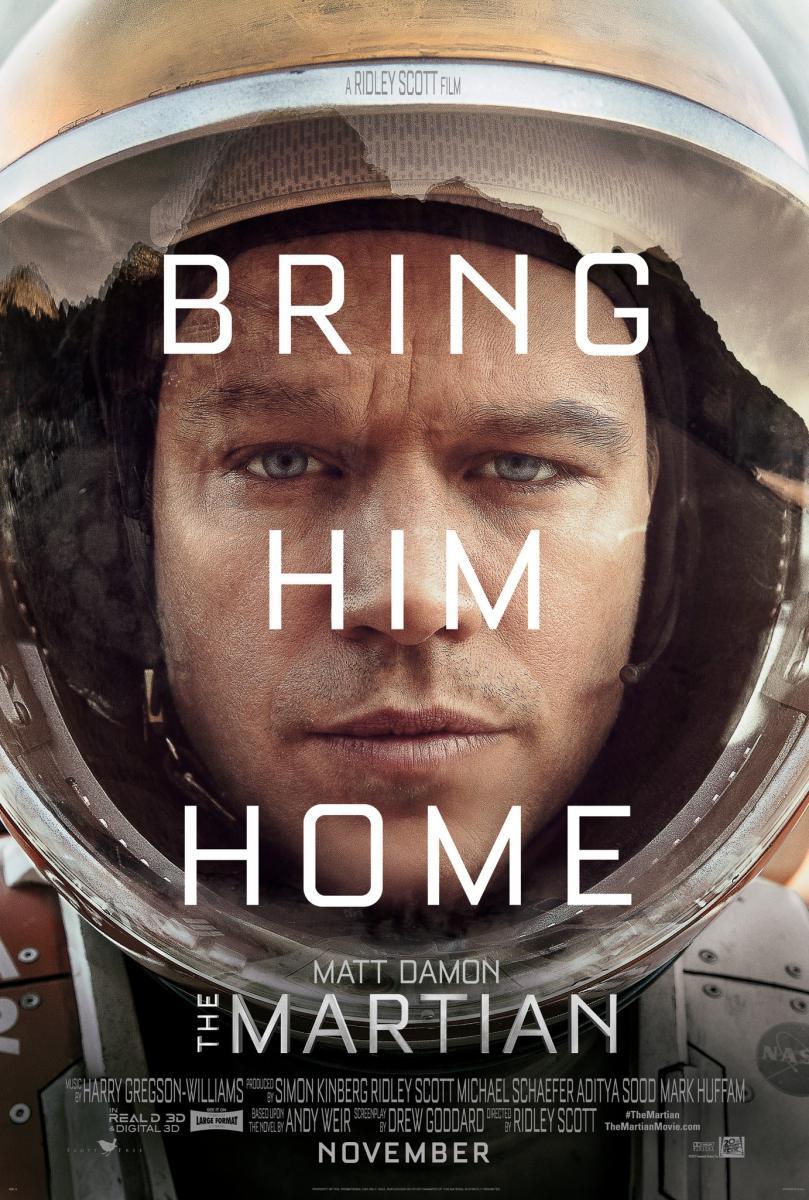Andy Weir's version of Mark Watney highlighted the character's humor and how something like that can go a long way in surviving horrifying situations. While reading the novel I speculated as to the deterioration of Watney's mental state, which was always masked in sarcasm and science, but the psychological impact was never thoroughly explored. This is one aspect of character that the movie was able to flesh out and show. Ultimately, the ability to show Mark Watney sink into depression or frustration before springing back out of it with his humor went a very long way. I was also horrified at the depiction of Watney's physical state as his diet changed. The contrast between Damon's fit physique in the beginning of the film and the emaciated malnourished shell of a man he became with a rationed diet of potatoes was shocking, and something that the film brought to life in the way the book did not.
It would have been difficult for Andy Weir to show Watney's moments of utter despair considering the narrative structure of the novel and the mainly first person perspective SOL Log recordings. It probably would have felt forced in the novel, but the medium of film allows for these intimate glimpses at facial expressions and body language that carry a lot of tell. In this sense, I felt the movie was much more successful at establishing a well-balanced character, but all the same I missed the lighthearted and forever sarcastic version of Watney. But I suppose that is only believable up to a certain point.
I actually watched a deleted scene from the movie in which Watney addresses each of his crew mates in his SOL Log as he tries to do portions of their jobs. I'm disappointed the scene didn't make it into the movie - it nails Watney's dry humor. I feel like it would have elevated his character and his relationship with his crew mates. Obviously, we know they've traveled a long way together, but in the book you find out just how much time they all spent together and how Watney was the heart of the team. The deleted scene is a reflection of how close they all were, which highlights the impact the loss of Watney had on the crew. I encourage everyone to find this scene and enjoy it.
There were some other interesting choices made regarding characters. Jeff Daniels' portrayal of Teddy was perfectly adequate except they tacked onto Teddy's character a lot of Annie's (Kristen Wiig) attributes. In the book, Annie is the media shark. She's always challenging the scientifically minded men with the viewpoint of the common people, and rightfully so given that she is their media relations representative. The movie butchered her character, and I found her presence to be utterly useless once this occurred. All the power was given to Teddy. Kristen Wiig could have nailed that part, and going into the movie with having read the book I was excited to see her shine as a hard ass foul mouthed woman. Instead, she just looked worried a lot and had like maybe ten lines.
 |
| Source: Newsweek |
Donald Glover was a surprise, popping up as Rich Purnell, and though the part was small I thought he nailed the awkward genius that comes up with a maneuver that leads to Watney's rescue. Chiwetel Ejiofor as Venket Kapor was lovely and well acted (I expected no less), and the character felt similar to what was portrayed in the book. Yet, again, Venket and Annie had a rapport that I wished were translated to the screen. Venket also had a sense of humor in the books that wasn't translated completely to the screen, but these are just minor details. Jessica Chastain as Commander Lewis was spot on for me, and I appreciated that the ending was changed up a bit in details to elevate her role in Watney's rescue. It served both their characters in that Lewis was wracked with guilt for leaving Watney, and Watney was saved by her choice of mutiny and facing a possible court marshall upon her return to Earth. There was just the right balance struck in the complexity of their relationship.
There were a couple of things left out of the movie that were in the book; the fact that Mark Watney is a mechanical engineer as well as a botanist, a huge storm on his cross-Mars Rover trip, the re-loss of communication with NASA, the Rover accident, and Weir's general reflection on humanity rooted in an abandoned man on Mars. However, Drew Goddard's screenplay was really tight writing, and it touched upon an element in recent space movies that has been missing: scientists problem solving. Space is a scary place, and movies like Gravity and Interstellar reinforce the terrifying elements of the unknown that are often encountered in space. Goddard gave a screenplay full of people thinking their way through problems and finding viable solutions. It was a very pro-science movie, which I think is a welcome change to the typical presentation of space horror. In addition to the amazing brain work happening, we also got to see global cooperation among space programs, and a heavily invested public viewing of the Mars rescue mission that while may be unlikely - is a great unifying prospect.
Read it. Watch it. Love it. Also, let's go to Mars...have you heard there's water there?

No comments:
Post a Comment